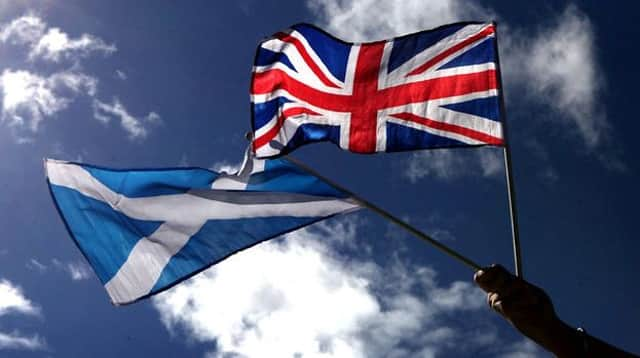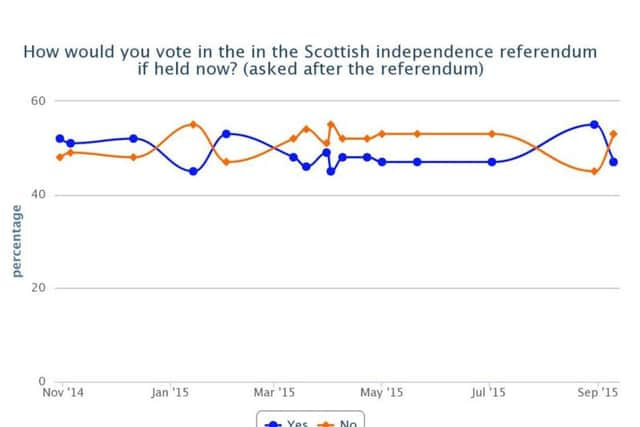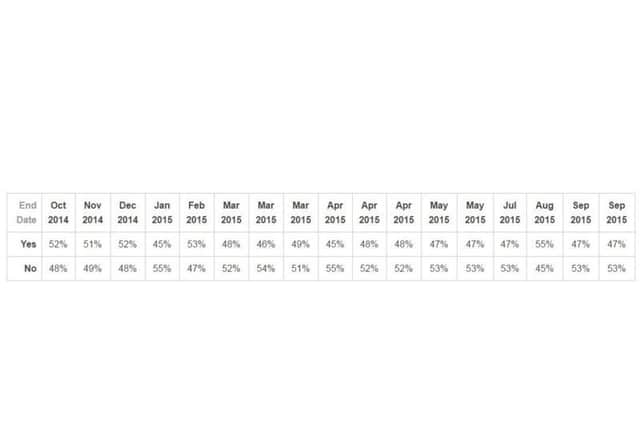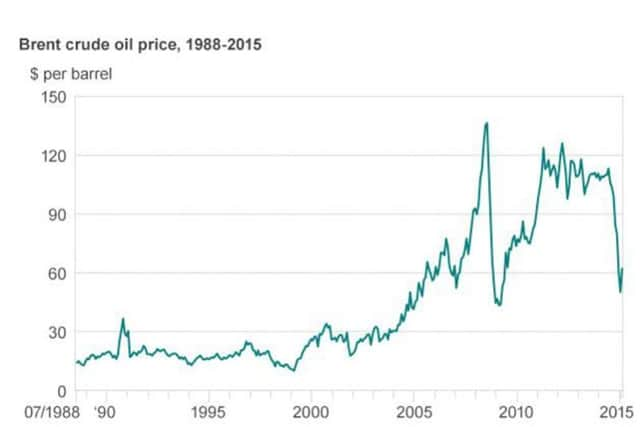Independence referendum one year on: The winners and losers


A year has passed since that historic day on 18 September 2014 when Scots took to the ballot box to decide whether Scotland should become an independent country.
As polling day drew closer, the outcome seemed uncertain after one YouGov poll sensationally put the “Yes” side aheadfor the first time during the whole campaign.
Advertisement
Hide AdAdvertisement
Hide AdYet despite the considerable ground the pro-independence cause made during the two-year campaign, it was not enough to persuade Scots to vote Yes.
The “No” voters ensured Scotland would remain in the United Kingdom, with 55 per cent voting No, and 45 per cent voting Yes.
Since that momentous day 12 months ago, the Scottish public’s attitude towards opinion has been closely monitored by pollsters and media outlets.
What Scotland Thinks (WST) - which collects and analyses survey data - mapped public opinion to the question, “How would you vote in the independence referendum if held now?” over the last year.
WST collated information from six of the largest polling organisations - YouGov, Panelbase, Survation, ICM, Ipsos Mori and TNS-BMRB - to show the changing levels of support for independence in the post-referendum landscape.


Support for the Union has remained ahead for the majority of the year but the gap remains slim and at certain points in the last year, such as August, those backing independence outnumbered those on the No side.
Analysing these results in a WTS blog, Professor John Curtice wrote: “Little has changed in recent months, it looks as though we have to conclude that there has not been a significant shift in the balance of support for independence and the Union – but that, twelve months on, the unionist hope that the referendum would prove to be ‘decisive’ now looks forlorn.”
The aftershocks of the political earthquake caused by the referendum continue to reverberate across Scotland. With the 20 / 20 vision of hindsight, there have been clear winners and losers since the referendum.
WINNERS


The SNP
Advertisement
Hide AdAdvertisement
Hide AdDespite losing the referendum the Scottish Nationalist Party have emerged as the biggest winners over the last year.
Buoyed by an energised referendum campaign, SNP membership swelled from 25,000 members prior to the referendum to over 112,000. As Alex Salmond stepped down in the wake of referendum defeat he was replaced as First Minister by his deputy Nicola Sturgeon, who has continued to ride a wave of popularity and take the SNP to unprecedented levels of backing across Scotland.
Perhaps the biggest success for the nationalists was their dramatic victory in Scotland at the General Election on 7 May 2015. Taking 56 of the 59 Scottish seats at Westminster, the SNP swept aside Labour strongholds and signalled their domination of Scottish politics.


Greens
Proof that the SNP do not have a stranglehold on the pro-independence movement, the Scottish Greens have also enjoyed significant membership gains.
The party had just 1,700 registered members prior to the referendum but since the vote this has grown more than fivefold to 9,000 members.
Scottish Democracy
Irrespective of where you sit on the political spectrum, left or right, Yes or No, few would dispute that the independence referendum was a resounding triumph for political engagement.
A total of 3,619,915 Scots voted on 18 September, a turnout of 84.5 per cent which was a record turnout for any UK election since the dawn of universal suffrage in 1918. Areas such as East Dunbartonshire, East Renfrewshire and Stirling recorded over 90 per cent turnout.
Devolution
The level of devolution being offered in the Scotland Bill is a divisive topic as many Nationalists believe it falls short of what was promised to the Scottish voters in the dying days of the referendum campaign as part of the so-called Vow made by the Westminster leaders of the three biggest parties.
Advertisement
Hide AdAdvertisement
Hide AdHowever, the issue of devolution - so often kicked into the long grass during political discourse - has re-emerged this year as a significant issue across the whole of the UK. How the UK governs itself at regional levels remains an unanswered question.
LOSERS
Labour
It’s been quite a year for Labour. They may have been on the winning side of the referendum battle but they appear to be losing the war and losing Scotland.
In a tumultuous 12 months, two leaders of Scottish Labour have resigned - Jim Murphy and Johann Lamont - membership numbers have fallen reportedly below 13,000 and a truly disastrous general election left them with only one Scottish MP - Ian Murray.
South of the border Labour fared no better as the Conservatives confounded the polls to snatch an overall parliamentary majority.
North Sea Oil and Gas Industry
Scotland’s oil and gas industry was a major talking point during the referendum as both sides argued over the future of Scotland’s oil reserves and its economic impact on the country.
Since the referendum oil revenues in the North Sea have plummetedby a factor of almost six in just a year, to its lowest ever level.
The declining revenue is a direct result of the price per barrel dropping from $115 in June 2014 to just $46 in June 2015. The sliding oil price has made off-shore oil - which is much more expensive to extract than oil found on land - a very costly business and thousands of jobs in the sector remain at risk.